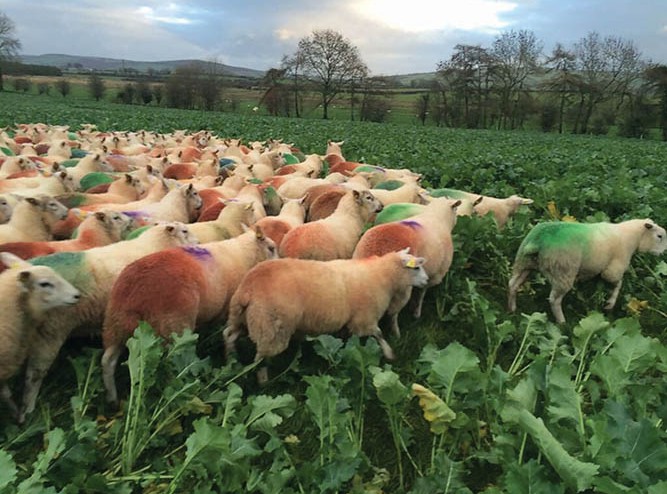
Sheep farmer Brian Nicholson of Tullyvolty House Farm in Johnstown, Kilkenny is passionate about what he does and, along with his wife Alison, runs a progressive and sustainable operation.
Sheep farming is an important indigenous industry in Ireland, with widespread production throughout the country and some 35,000 flock owners at farm level.
Unlike production in other European and southern hemisphere countries where large scale intensive production is the norm, sheep meat production in Ireland remains largely a traditional farming activity, where small holdings are carefully tended by farmers with a proud tradition of excellence in food production.
Brian Nicholson certainly fits that bill and the lambing season was well underway when Irish Tractor & Agri caught up with him – “500 to 600 ewes have lambed at this stage,” he revealed.
Lambing time is very hands-on and spare time is a scare commodity for sheep farmers. That being said, seeing all the lambs out in the field makes the constant toil worth it.
Natural Irish lamb, reared in the temperate climate and near organic conditions of Ireland’s unspoilt countryside, has an internationally recognised reputation for quality. Its delicate flavour, wholesomeness and versatility has earned Irish lamb a special place in the hearts of consumers throughout Europe.
Grassland management is a cornerstone of Brian’s approach when it comes to looking after his flock of 1,100 ewes on his farm’s 108 ha.
“It goes without saying that one of the key components is doing it as cheaply as possible to maximise profit,” he answered when asked the secrets behind a successful sheep farm. “Grazed grass is what I aim for and I try to get as much out of that as possible.
“We keep our stock outside as much as possible, keep them out grazing. That results in housing for shorter periods which cuts down on costs. We added an extra shed last year that can hold 500 ewes lambing down.
“We’ve a couple of other sheds which can hold 100 each and we’ve roughly 130 individual pens around the yard.
“Grass is the one thing I am passionate about and I’m alway trying to improve the grazing practices on the farm. Five years ago when I started down this road, I thought eight ewes per hectare was a high stocking rate but I’ve learned with experience and I’m up to 12 now.”
Brian’s appetite for continuous learning has stood him in good stead up to this point – “The day that you think you know it all, it’s time to give it up!” – and he has a word of advice for all the aspiring young farmers out there…
“I would advise all young farmers to get as much experience as possible. They should travel and experience all the different aspects of farming and get insights to help them decide what way they want to go.
“There’s every chance that they might change direction with a bit of experience. Initially, I wanted to stay in cattle but I discovered that there was a few more pound to be made in sheep and life is a little bit easier thanks to the handling facilities.”
What are the biggest challenges Brian faces in the day-to-day operations of his sheep farm?
“The weather is number one. It’s either with you or against you, there’s no middle ground. Price is another, trying to predict what the price will be the following year can cause problems when it comes to planning for the months ahead. Unfortunately, that’s not something that you have much control over.
“Controlling your inputs is the next step. You should always focus on just buying what you need.”
Brian took over the running of Tullyvolty House Farm 10 years ago following the passing of his grandfather Thomas who was a well-known figure in the world of horse racing
“I did a year in Kildalton agricultural college and was farming in my own right on rented grounds. My grandfather has bought Tullyvolty House when he got married in the fifties. My father John farms and trains horses on a separate block of land while my brother Sam works with horses in the States.”
A typical day in the life of Brian involves a 6am start to check on the sheep in the sheds and then the fields. 11pm finishes are common place at this busy time of year. He employs one part-time person and student vets during the Spring for an extra bit of help.
Are there any plans in the pipeline for further expansion?
“I have scope to expand but I don’t want to expand too much because it’s mainly me on my own and I don’t want to be running around, flat out all the time, particularly with a young family. I’ve one daughter, Mia (5), and one son, Drew (3), and they pulled their first lambs this year!”
Like father, like children!
Brian Nicholson Sheep Farmer
Tullyvolty House Farm
Johnstown
Co. Kilkenny
Taken from Irish Tractor & Agri magazine Vol 4 No 4, April/May 2016